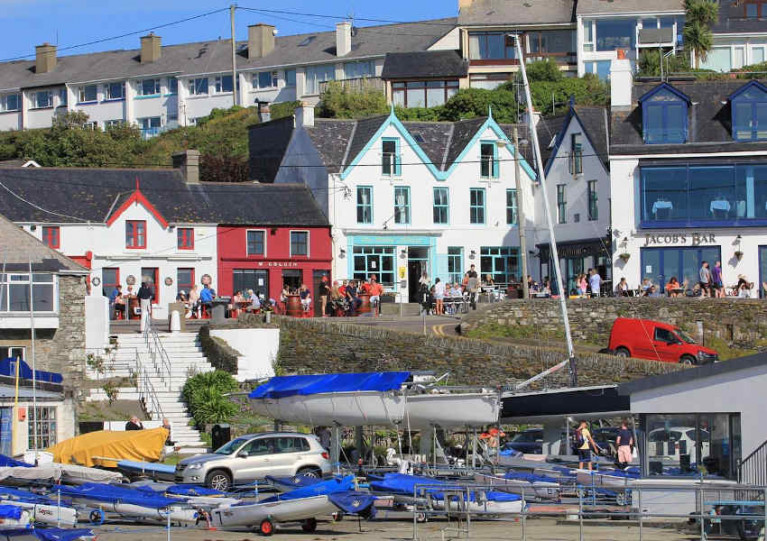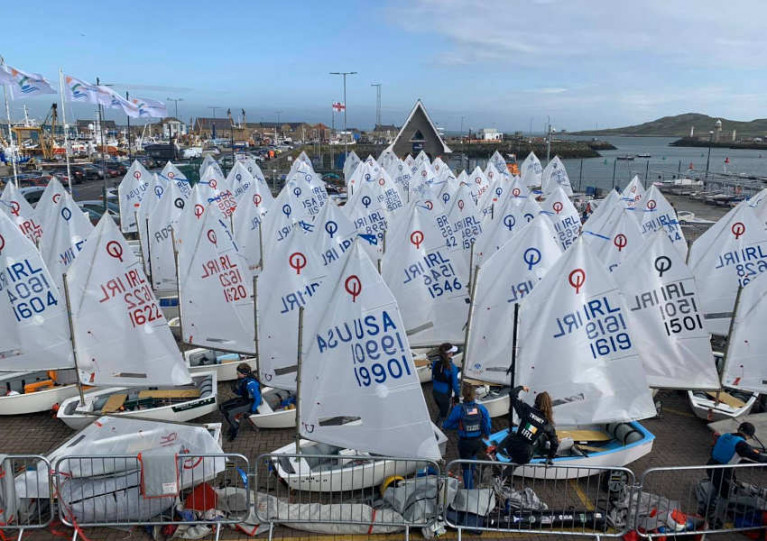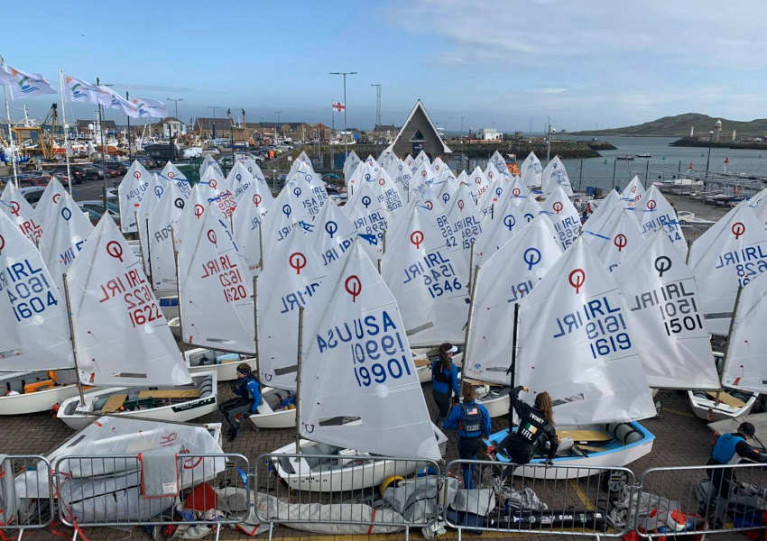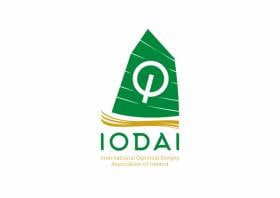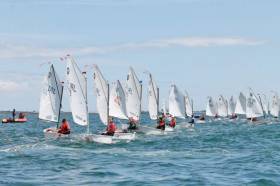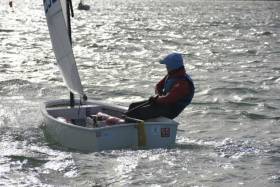Displaying items by tag: IODAI
Success for Royal St. George Yacht Club Optimist Sailors in 2022 IODAI National Rankings
In the 69-boat Optimist dinghy Senior Fleet, Dun Laoghaire Harbour's Royal St. George Yacht Club had eight sailors in the top 15 of the 2022 IODAI National Rankings, namely Jules Start (1st boy and 1st overall), Caoilinn Geraghty- McDonnell (1st girl and 2nd overall), Conor Cronin (2nd boy and 3rd overall), Abigail Murphy (2nd girl and 5th overall) and Carolina Carra (4th girl and 7th overall), Marcus Shelley (7th boy and 12th overall), Hannah Scott (6th girl and 14th overall) and Zita Tempany (7th girl and 15th overall).
In the 58-boat Junior Fleet, a further seven George sailors finished up in the top 15 of the 2022 IODAI National Rankings, namely Lily Donagh (1st girl and 1st overall), Emily Donagh (2nd girl and 2nd overall), Maeve Donagh (3rd girl and 6th overall), Max O’Hare (5th boy and 8th overall), Juliette Ryan (5th girl and 10th overall), Finn Foley (6th boy and 11th overall) and Ella Rock (6th girl & 12th overall).
"These results are a testament to the hard work these and all of the other 20+ George sailors competing in Main Fleet at IODAI National Events have put in both on and off the water throughout the year", RStGYC Optimist Performance Program Organiser Gavan Murphy," told Afloat.
"Recognition must also go to Sarah Fogarty and Peter Fagan, who runs the Oppie performance coaching programme in the George", Murphy added.
Lough Derg Yacht Club, with the support of Dinghy Performance, will be running three days of mid-term coaching for Optimist sailors from Thursday 24 to Saturday 26 February 2022.
“We are sure this is going to be a great event and a cracking way to kick off the year,” the International Optimist Dinghy Association Ireland says.
Entries are limited and more than a third of all available spots have been claimed, so early booking is essential.
IODAI Offers Updates for 2021 Optimist Calendar
With the uncertainty of event restrictions and requirements, the International Optimist Dinghy Association of Ireland (IODAI) and Howth Yacht Club have jointly decided to limit numbers competing in the postponed Leinster Championships to 80 main-fleet boats.
Expressions of interest for the event on the weekend of 3-4 July are now open for main fleet sailors until next Friday 28 May, with regatta fleet entry opening at a later date. Entries will be on invitation from the expression of interest on a first come, first served basis.
Interest will also be sought from main fleet sailors for July’s Connaught Championships from 8pm next Friday, with regatta fleet entry to be confirmed.
When IODAI and HYC have more clarity on event restrictions and requirements, the number of competitors for both of these events may increase.
The latest news updates a shifting calendar for the 2021 Optimist season, which already saw the cancellation of the trials event originally scheduled for earlier this month at the Royal St George Yacht Club.
In its place, the Dun Laoghaire waterfront club has a green to host an Optimist event on the weekend of 4-5 September
The IODAI is also in the process of planning the ‘Spirit of Baltimore’ event which will take place over the October mid-term, hosted by Malahide Yacht Club, with details to follow.
The current 2021 Optimist calendar looks like this:
- Leinster Championships - Howth Yacht Club, 3/4 July
- Connaught Championships - Lough Ree YC, 17/18 July
- Irish National Championship - Lough Derg YC, 19/20/21/22 August
- Optimist Event - RStGYC, 4/5 September
- Ulster Championships - East Antrim Boat Club, September (TBC)
- Munster Championships - Late September/ Early October (TBC)
- Spirit of Baltimore incorporating Crosbie Cup - Malahide YC, 27-31 October
Different Look to Irish Optimist Calendar in 2021
The Irish Optimist calendar will look a little different for 2021 due to continued disruption amid the coronavirus pandemic.
The first casualty of the present restrictions is the spring training week in Baltimore. However, the International Optimist Dinghy Associaton of Ireland (IODAI) says its committee is looking at hosting an alternative ‘Spirit of Baltimore’ event.
As for the season proper, it’s scheduled to begin on the long weekend of 1-3 May with trails at the Royal St George Yacht Club, followed by the Munster Championships at Kinsale Yacht Club on 15-16 May.
June sees the Leinster Championships at Howth Yacht Club on the 12th and 13th of the month, while the Connacht Championships will be contested at Lough Ree Yacht Club on 17-18 July.
The Irish Nationals will be hosted at Lough Derg Yacht Club on 19-22 August, and the season provisionally closes out with the Ulster Championships at East Antrim Boat Club on 11-12 September.
Due to the impact of COVID-19 restrictions, the IODAI says a number of alternative dates are being looked at in the event that trials are unable to run in May.
The Royal Cork Yacht Club has confirmed that its hosting of this year’s Optimist Nationals will proceed as planned next month, and the Notice of Race is now available.
The AIB Optimist Irish National Championships 2020 run from 13-16 August as part of the Cork300 celebrations.
And with many top youth sailors unable to travel internationally, their competitive spirit is expected to make this year’s event one of the hottest ever.
Pre-registration is open until next Wednesday 22 July via the IODAI, and sailing instructions will follow shortly.
Optimist Sailors Hailed As ‘Most Adaptable In The World’ In Face Of Season’s Disruption
The International Optimist Dinghy Association of Ireland (IODAI) promises its young members “will laugh, rig, race and have lots of fun both on and off the water” when sailing eventually resumes.
In a statement on its Facebook page last week, the IODAI said: “We hope that you, your parents, family and friends are well in these difficult times. We know how hard it is at the moment and how much life has changed so much for you in just a few weeks.
“We are so proud of all our Optimist sailors who are doing their best with adapting to this new and temporary way of life, with online school, exercising close to home, only catching up with friends on social media and of course how you have taken to online sailing regattas!
“It just shows what we have always known that Optimist sailors are the youngest sailors in the world but they are also the most amazing adaptable bunch of sailors in the world.
“We were very sorry to have to cancel trials, and our events in May and June. We know how hard you all train all year and look forward to being out on the water with your friends in particular in the summer months.
“We don’t know when we will be able to all get back out sailing. But we know that when we do it will be amazing. Families and friends from around the country and indeed the world will connect again ... we will laugh, rig, race and have lots of fun both on and off the water.
“We would also like to say a special word of thanks to all the people working hard in the front line services who are keeping us safe in these unprecedented times.”
The IODAI also expressed its hope that members “remain safe as we navigate these uncharted waters together”.
Optimist Spring Training Dates Set For 2020 In Baltimore
16-21 February are the dates to save for Optimist Spring Training at Baltimore Sailing Club in West Cork.
This year the class has teamed up with freelance dinghy performance coach Thomas Chaix to work collaboratively on training sessions to kick off the season — riding high on the international success of Oppy helms like Rocco Wright.
And at the end of the week the assembled Optimist sailors have their pre-trials regatta.
On the social side, IODAI has organised a movie night at Casey’s Hotel and an end-of-week disco with the opportunity for parents to relax and meet up for a meal.
Registration for 2020 Spring Training is now available online. For more details contact Mandy at [email protected] see the IODAI website.
Optimist Association Seeks New Committee Volunteers
The International Optimist Dinghy Association of Ireland (IODAI) is setting two volunteers to fill key positions in its committee.
The roles of teams organiser and child safety officer do not require the volunteer to have any sailing experience or knowledge, only the “drive and enthusiasm to get the right things done”, according to the IODAI.
In addition, the IODAI is looking for a new assistant treasurer, as well as volunteers to take over from the current committee president and event manager as Tim Lucas and Colm Paul will be stepping down from their respective roles this September.
For details on the teams organiser or assistant treasurer roles, contact Conor Turvey at [email protected]. For the child safety officer role and presidency, email Tim Lucas at [email protected]. For the event manager role, email Colm Paul at [email protected].
#Optimist - Waterford Harbour Sailing Club will host the IODAI Optimist Munster Championships 2019 in Dunmore East on the weekend of 20-21 July.
Regatta, Junior and Senior fleets will race in the event which is open to all boats of the International Optimist Dinghy Association of Ireland.
The Notice of Race and Sailing Instructions, when made available from the IODAI, will be posted on the WHSC website.
Club co-ordinator for this event will be Rene Wubben and enquiries may be sent to [email protected] in the meantime.
The event comes a month before the Optimist National and Open Championships at Howth Yacht Club, as announced last October.
Countdown to Baltimore Optimist Spring Training Week
#Optimist - Baltimore Sailing Club have started preparations for the annual invasion of Irish Optimist sailors for the week from next Sunday 17 February.
The International Optimist Dinghy Association of Ireland’s (IODAI) team of coaches are making plans for training both on and off the water.
Participating sailors are reminded to check and label all their equipment before packing for the week, especially if it has been put away all winter.
“We are looking forward to a great week of fun, action and friendships both on and off the water,” the IODAI said.
Meanwhile, registrations are now open for the 2019 Optimist Trials which will take place as part of the Irish Sailing Youth Nationals at the Royal Cork from 25-28 April.
Entry is by invitation only based on 2018 season results. Entries made before 10pm on Thursday 28 March will avail of the early bird rate of €120 (entry thereafter is €200) with the final date for entries no later than 10pm on Thursday 11 April.


























